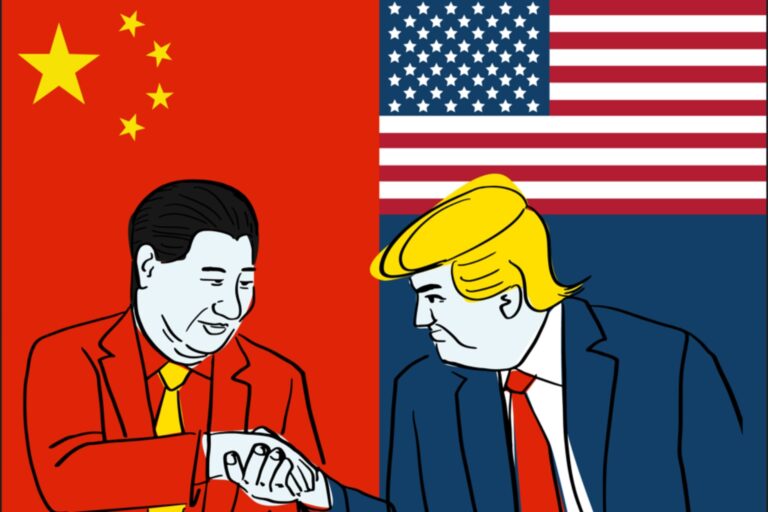Of all the myths and fabrications that exist in political discourse, few are more stubbornly persistent than the scarcity of resources and the policies supposedly needed to control them. Today, that discourse has converged around one definitive commodity: oil. The omnipresence of oil in the modern economy is eclipsed only by the persistent belief in its perceived exceptionalism, the determining factor in the struggle for geopolitical dominance.
Finally, this phenomenon has a name—oilcraft. Closer to “witchcraft” than to statecraft, Robert Vitalis defines oilcraft as a set of dogmatic beliefs: that oil is somehow exceptional and that it holds unique political and economic power that can be controlled—which has undeniably directed US policy and rhetoric over the last century.[1] Vitalis argues this belief is little more than an ideological construction (one he effectively dismantles in less than 150 pages). An adeptly persuasive text, Oilcraft offers a breath of fresh air for anyone at their wits end over oil’s inflated importance in international politics.
Vitalis reserves his opening to denounce the idea that the Iraq War was predicated on securing oil, along with the advocates who embraced it. From conservative economist Alan Greenspan to liberal columnists for The Nation, many weaponized oilcraft for professional gain. Meanwhile facts were ignored. Despite the invasion of Iraq, US access to oil did not grow and prices continued to climb throughout the 2000s. In fact, if the American foreign policy establishment sought oil, all it needed to do was lift the sanctions it had placed on Iraq.[2] Vitalis’ ability to challenge these dogmatic ideas by presenting seemingly simple facts is what makes Oilcraft as refreshing as it is.
From there, Vitalis points out other inconvenient truths for oilcraft believers. Instead of controlling oil drilling and refining, the United States buys oil from private refiners on the international market. Vitalis reminds us that this market operates through surges and shortages in demand and supply, the same economic principles that govern every other commodity.[3] Understanding this, it is clear oil is not exceptional. Moreover, there exists no actor —not Saddam Hussein nor a united OPEC— that can manipulate the oil market in such a way to bar consumers. Perhaps more importantly, there has never been an authoritarian regime committed to disrupting the world’s oil supply enough that it would sacrifice the fantastic rents that come with exporting black gold.
While exposing oilcraft’s falsehoods, Vitalis is unsparing in his critiques, taking aim at politicians, activists, and intellectuals alike. Chief among them is former President Donald Trump, who won support among American conservatives with promises to take oil in Middle East ventures.[4] Of course, these promises bore no fruit, but the popularity of his statements show that the power of oilcraft lies in its public accessibility. Vitalis states that, “Arguments about access are… deeply engrained,” allowing presidents and their advisers to incur long term costs for short term political victories.[5]
However, Vitalis reserves his greatest ire for his fellow scholars of the Left, who see American foreign policy as a tool to control oil that fulfills its appetite for colonialism and imperialism.[6] Not settling for paltry columnists and activists, Vitalis instead trains his eye on the legendary Noam Chomsky. In one particularly brutal dressing down, Vitalis cites Chomsky’s assessment that the Vietnam War was fought to secure Western access to raw materials in Southeast Asia by reminding us that the region was largely insignificant for America’s regional allies and “empire” at large. Vitalis’ assessment moves quickly to castigating Chomsky’s response that the factual ‘accuracy’ of the economic and historical record ‘is clearly irrelevant.’ The absurdity of such an answer is self-evident of “a degenerative research paradigm” and leads Vitalis to rightly conclude “how much analytical ground [has] been lost by the Left.”[7]
Vitalis also takes accepted histories behind oilcraft to task by taking aim at the historical records that serve as its ideological foundation. In chapter two, Vitalis provides an overview of the resource scrambles of the early 20th century, showing that the ideology of resource scarcity has been practiced with other raw materials for decades. Meanwhile, chapter four provides a reality check on the US-Saudi relationship. Vitalis argues that this relationship, which is often cited as the key to American oil access, does little more than “disarrange and misdirect thought” on the reality of oil economics in the 20th century.[8]
The weakest part of Vitalis’ argument comes in the third chapter, where he attempts to correct the record of the 1973 OPEC oil crisis. Vitalis’ explanation is imperative to his argument’s integrity: 1973 serves as the specter used by oilcraft’s believers to intimidate those who refuse to give the argument the adherence it demands. But while Vitalis’ arguments lay out fundamental contradictions to the accepted histories (for example, that other Western countries did not experience any oil shortfalls during the period), his alternative explanations remain confusing and unclear. Ironically, Vitalis’ shortcomings still seem to reinforce his thesis: that in the wake of complex explanations and countless details, oilcraft’s allure lies in its simplicity and accessibility.
Despite those shortcomings, Oilcraft fulfills its purpose as historical literature. In the words of Vitalis, historical literature analyzes evidence, thereby “reverse engineering [the] process of mythmaking.”[9] This quality remains rare in scholarship today. It is even rarer to find a work that is comprehensive in both its analysis and its response to such a pervasive and unrecognized system of beliefs. By touching on everything from oil economics to American foreign policy and Middle East history with such a refreshing and succinct style, analysts, politicians, and intellectuals alike will be referencing Oilcraft for years to come.
[1] Robert Vitalis, Oilcraft: The Myths of Scarcity and Security that Haunt U.S. Energy Policy (Stanford: Stanford University Press, 2020), 6.
[2] Vitalis, Oilcraft, 3–4.
[3] Vitalis, Oilcraft, 8.
[4] Vitalis, Oilcraft, 3.
[5] Vitalis, Oilcraft, 12.
[6] Vitalis, Oilcraft, 3.
[7] Vitalis, Oilcraft, 53–54.
[8] Vitalis, Oilcraft, 83.
[9] Robert Vitalis, America’s Kingdom: Mythmaking on the Saudi Oil Frontier (Stanford: Stanford University Press, 2007), xviii.




